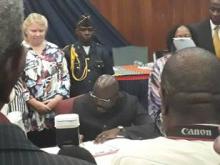Land Library
Welcome to the Land Portal Library. Explore our vast collection of open-access resources (over 74,000) including reports, journal articles, research papers, peer-reviewed publications, legal documents, videos and much more.
/ library resources
Showing items 55 through 63 of 507.This primer on monitoring and evaluation (M&E) offers a brief explanation of what M&E is, why it is important and what common best practices are associated with it, all in the context of supporting the implementation of a socially responsible land-based investment.
In a watershed moment for land rights in Liberia and across Africa, President George Weah on Sept. 19 signed into law a land reform bill that extends land rights to millions of rural Liberians.
Land is the most important asset for many rural Liberian women and men, and is often a family’s primary source of cash income, food and nutritional security, health care, and education.
This study provides a case study of the mango value chain in Kenya and seeks to better understand key linkages between land rights and project outcomes.
Over the last decade, there have been considerable concerns raised regarding the social and environmental impacts of large-scale land concessions for plantation development in various parts of the world, especially in the tropics, including in Laos and Cambodia.
WEBSITE ABSTRACT: This case study presents a country-wide quantitative analysis of a Parliamentary Commission established in 2012 in Myanmar to examine ‘land grab’ cases considered and to propose solutions towards releasing the land to its original owners, in most cases smallholder farming famili
This paper focuses on one community in Cambodia that won back land from a large land deal by grabbing onto the rupture in property relations initiated by a one-year land titling campaign.
This article focuses on how climate change mitigation policies and economic land and mining concessions in Prey Lang, Cambodia, accommodate and facilitate each other physically, discursively and economically.
ABSTRACTED FROM EXECUTIVE SUMMARY: This guidebook provides conceptual, legal and practical tools and resources to help civil society organizations guide communities through the process of documenting customary tenure at the local level.





